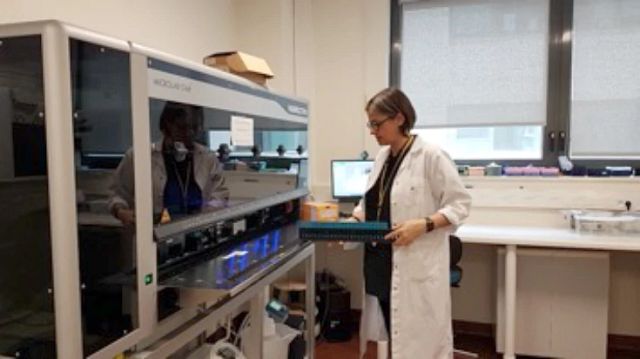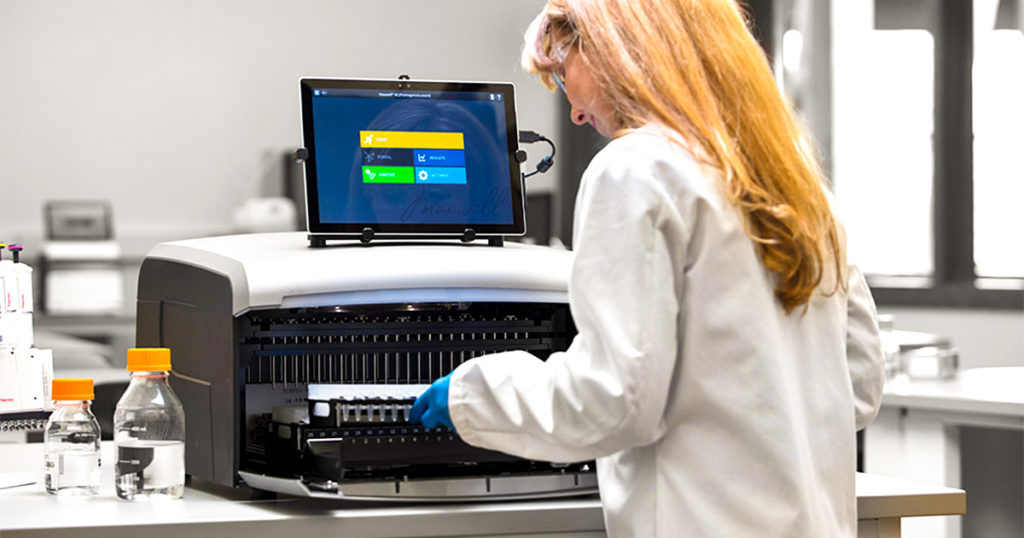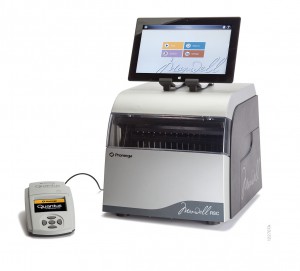This review summarizes Valto Biocontrol’s move toward a high-throughput (HT) nucleic acid extraction solution utilizing Promega Maxwell® HT simplyRNA Kit, Custom. This project was initiated by Dr. Menno Westerdijk, Head of Laboratories at Valto Biocontrol, who established a molecular laboratory onsite. The Promega Field Support Scientist team assisted Dr. Westerdijk to develop an automated nucleic acid solution using their existing KingFisher™ Flex robot. Dr. Westerdijk’s extensive experience working with KingFisher robots in the agricultural sector combined with expert guidance from Promega Field Support enabled a seamless implementation of the Maxwell® HT chemistry for his laboratory.
Continue reading “Streamlining Plant Pathogen Detection: Valto Biocontrol’s Integration of Promega High-Throughput Nucleic Acid Extraction Platform”automated dna extraction
Improved FFPE Tissue Sample Processing with High-Throughput Automated DNA Extraction
In oncology, tissue biopsies are commonly fixed in formalin and embedded in paraffin (FFPE). These FFPE samples can be used with immunohistochemical or molecular analysis for identifying biomarkers that guide the diagnosis and therapeutic management of patients. This fixation technique allows long-term storage of samples but impacts the integrity of nucleic acids. This makes extracting DNA and RNA from FFPE tissues in sufficient quantity and quality for molecular analysis techniques such as NGS analyses challenging for molecular oncology laboratories.
“At Rennes University Hospital, we receive many lung cancer samples with little material available, or samples of poor quality. The nucleic acid extraction step is therefore critical to get good yield. We have seen that it had a direct impact on the success of downstream analysis,” said Dr. Alexandra Lespagnol. Lespagnol is the Technical Manager of the Molecular Genetics of Cancer core lab at the University Hospital of Rennes in France.

In order to accommodate the increasing number of samples that needed to be analyzed, the Molecular Genetics of Cancer core lab of the University Hospital of Rennes initiated an automation project for extracting DNA from FFPE tissues. The lab also wanted to improve sample tracking and reproducibility of their results.
Continue reading “Improved FFPE Tissue Sample Processing with High-Throughput Automated DNA Extraction”Why Bring Automated Nucleic Acid Extraction into Your Lab?

Nucleic acid extraction is a time-consuming, resource-intensive process, but it doesn’t have to be. Automated systems are becoming more and more accessible and often can be operated with simple “plug and play” kits, freeing valuable resources
With these systems increasingly within reach, perhaps you’re thinking about introducing automated nucleic acid extraction into your lab. As you consider your options, here’s eight reasons why we think you should automate your nucleic extraction workflows.
8 Reasons to Automate Nucleic Acid Extraction in Your Lab:
1. Reach your project milestones and publish faster.
In the fast-paced, competitive environment of research and technology development, efficiency is key to reaching project milestones and publishing your work. Managing your resources effectively–especially time–can help you reach those goals.
Time spent on manual nucleic acid extractions is time lost on parallel work, which cuts down productivity. Automation is not only often faster than manual preparations, but it also frees your team to do more valuable hands-on work.
As an example, the Maxwell® RSC cuts 40 minutes of hands-on-time per 16 samples. As the number of samples scales to 96 and beyond, liquid handlers like the Hamilton Star or Tecan Fluent can save many hours of hands-on-time per day.
Continue reading “Why Bring Automated Nucleic Acid Extraction into Your Lab?”Freedom to Focus: Maxwell® Rapid Sample Concentrator

Back in the dark ages, when I was a graduate student, my idea of “automated” plasmid DNA extraction involved performing home-brew, “toothpick preps” in “strip tubes” or , if I was really feeling ambitious, a 96-well plate.
I would get just enough DNA to check for the presence of an insert, but the quality of the DNA was too low and the quantity too small to even consider using it for any other downstream experiments like amplification.
And increased throughput for other nucleic acid extraction needs? Nope. If I wanted genomic DNA, RNA or high-quality plasmid DNA, I spent time with columns and tubes, giving each sample my undivided individual attention.
Remember cesium chloride preps for RNA isolation? Even with the advent of column purification, which greatly simplified and standardized my protocols, nucleic acid purification was still a manual task that required a lot of time and effort to get the high-quality product I needed.
Doing the experiments that would answer the questions that I really wanted to ask (those “downstream experiments”), meant spending time at the bench performing careful (if tedious) work to isolate and clean up the highest quality nucleic acid possible. Even then inconsistency in sample prep could wreak havoc on downstream work.
Fortunately, for the modern scientist, personal, bench top automation, has progressed far beyond the toothpick and the strip tube to quality-tested, reliable nucleic acid extraction platforms like the Maxwell® Rapid Sample Concentrator (RSC).
The Maxwell® RSC improves sample preparation consistency, eliminating variability associated with manual handling, and your downstream results will reflect this consistency. With the RSC you can extract DNA or RNA from up to 16 samples in approximately 1 hour and viral total nucleic acids in less than an hour.
The instrument is easy to use: simply load the sample, push a button and walk away. Cross contamination is minimized and the instrument is supported by the Promega technical support and service you have come to trust over the past 35 years.
Want to know more about how the Maxwell® RSC can give you the freedom to focus on the work that interests you the most? To learn more, click here.
